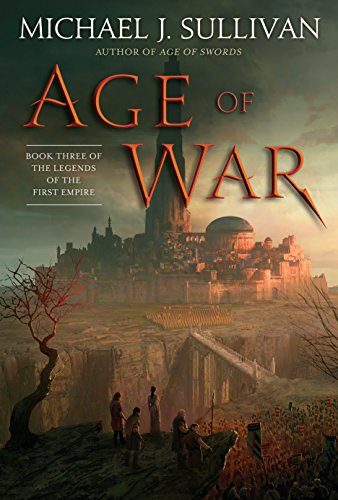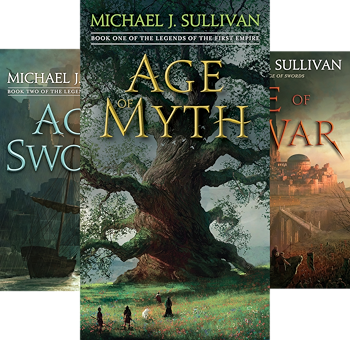 Age of War by Michael J. Sullivan
Age of War by Michael J. Sullivan
We (Tadiana and Marion) have both been reading THE LEGENDS OF THE FIRST EMPIRE series. Here, we take a few minutes to discuss the third book, Age of War.
![]() Tadiana: All the resentments, cruelties, conspiracies and ambitions that have been simmering since Age of Myth (and even before) boil over and explode in Age of War (2018), the third book in Michael J. Sullivan‘s LEGENDS OF THE FIRST EMPIRE series, a prequel series to both his RIYRIA CHRONICLES and RIYRIA REVELATIONS series. *Some spoilers for the first two books in this series follow* The Rhune (humans), finally unified (more or less) under the leadership of Persephone, and prompted by the designs of a small group of military Fhrey (elves), the Instarya, who have rebelled against their society’s leadership, move to take over the fortress of Alon Rhist, an outpost of the Fhrey in Rhune territory. The Instarya leader, Nyphron, is successful in his plan for a surprisingly bloodless takeover of Alon Rhist, but not everyone in Alon Rhist approves of the change in control.
Tadiana: All the resentments, cruelties, conspiracies and ambitions that have been simmering since Age of Myth (and even before) boil over and explode in Age of War (2018), the third book in Michael J. Sullivan‘s LEGENDS OF THE FIRST EMPIRE series, a prequel series to both his RIYRIA CHRONICLES and RIYRIA REVELATIONS series. *Some spoilers for the first two books in this series follow* The Rhune (humans), finally unified (more or less) under the leadership of Persephone, and prompted by the designs of a small group of military Fhrey (elves), the Instarya, who have rebelled against their society’s leadership, move to take over the fortress of Alon Rhist, an outpost of the Fhrey in Rhune territory. The Instarya leader, Nyphron, is successful in his plan for a surprisingly bloodless takeover of Alon Rhist, but not everyone in Alon Rhist approves of the change in control.
Lothian, the fane or leader of the Fhrey empire, has finally had enough of these pesky Rhune, not to mention the Instarya renegades, and begins gathering and training his legions to attack and retake Alon Rhist and exterminate the troublesome Rhune. The Fhrey armies move toward what they think will be a quick war and victory; after all, they’ve always had a monopoly on magical power, not to mention the secret of making bronze weapons while humans were still muddling along with stone and ― if they were lucky ― copper. But humans have a vast advantage in numbers over the Fhrey, plus a couple of powerful magical workers of their own.
Moreover, in Age of Swords, humans managed to swipe from the dwarves the secret of making iron weapons, though doing so correctly is still a work in process. Roan, resident Rhune genius inventor, is hard at work trying to figure out the lost secrets of iron-working, including ways to make it even stronger. Age of War doesn’t have quite the insane pace and number of society-transforming inventions that Age of Swords did, but the rapid advance in technology that Roan instigates is still eyebrow-raising, not to mention being the source of a snort-inducing pun.
With this buildup to war and the war itself as the setting, Sullivan delves into the lives of the individuals we’ve been following for the last two books. Nyphron has made a Persephone an offer of marriage to seal their alliance. Persephone sees the advantage of the deal for her people, but knows that Nyphron doesn’t really care about her on a personal level. Knowing that Raithe, a younger Rhune warrior, loves her deeply makes her choice even harder. Suri, the only human versed in the Art of magic, has an even worse choice to make.
![]() Marion: I thought the first third of this book moved rather slowly, and the silence between Persephone and Raithe smacked of a YA high-school romance. Surely someone could pass Persephone a note from Raithe in homeroom? Still, I loved the work Roan was doing at the forge, and the continued progress of the women who journeyed with Persephone to the land of the dwarves in the second book.
Marion: I thought the first third of this book moved rather slowly, and the silence between Persephone and Raithe smacked of a YA high-school romance. Surely someone could pass Persephone a note from Raithe in homeroom? Still, I loved the work Roan was doing at the forge, and the continued progress of the women who journeyed with Persephone to the land of the dwarves in the second book.
 Tadiana: Age of War moves the overall story arc of the LEGENDS OF THE FIRST EMPIRE along well. Characters have difficult, even heart-wrenching choices to make. Long-held secrets and plans are revealed. Twists are turned. Monsters menace. And possibly the shallow Mawyndulë gets just slightly smarter? I’m dubious, though, and still wondering why Sullivan chose this maddeningly obtuse youngster to represent the main viewpoint of the Fhrey.
Tadiana: Age of War moves the overall story arc of the LEGENDS OF THE FIRST EMPIRE along well. Characters have difficult, even heart-wrenching choices to make. Long-held secrets and plans are revealed. Twists are turned. Monsters menace. And possibly the shallow Mawyndulë gets just slightly smarter? I’m dubious, though, and still wondering why Sullivan chose this maddeningly obtuse youngster to represent the main viewpoint of the Fhrey.
Marion: Mawyndulë is one of the most interesting and annoying characters to me, simultaneously, and I give Sullivan full marks for pulling that off. I do hope, though, that we see some maturity ― or, as you say, at least wising up ― from him as the series progresses. The other character who we find out a bit more of in this book is the slave who helped Raithe in Book One, Malcolm. I look forward to learning more about him.
The goings-on back in the Fhrey kingdom were also interesting here, especially toward the end. One important aspect of this series is that only one clan of Fhrey are magic-wielders, and that fact is causing political unrest. This was not the best time for Lothian to leave his kingdom to prosecute a war, and we see the machinations starting back home. The most interesting aspects of that only occur in the last few pages, though.
Tadiana: I’m not as fond of Mawyndulë as Marion is, especially after three books of his idiocy, but I’ll grant that he does offer a unique and unusual point of view. After focusing primarily on female characters and viewpoints in the first two books of this series, Mawyndulë being one of the few exceptions, a few additional male point-of-view characters are added. The most significant of these is Tesh, an orphaned teen who is the most driven of all the Rhune in learning the art of sword-fighting. Tesh is so intense that Nyphron and his best fighter, Sebek, begin to be alarmed at what might be motivating his single-minded training. Tesh does take some time off from training to cautiously pursue a relationship with the scribe Brin. But the romance is a small side note to the war-planning and conflicts.
Marion: I do feel that the emotional burden placed on Suri, after the burden placed on her in the second book, is questionable and unbalances the plot. I am trusting that we will either see the balance redressed in some way, or that Suri will change in unexpected ways as a result of these decisions. And I felt Persephone’s lack of both agency and action in this one. That, in fact, might have contributed to my sense that the first third was slow.
Tesh is an excellent standard-bearer for the next generation, and I found his character arc in this book plausible and emotionally compelling.
Tadiana: I agree, Marion! Tesh was the most welcome character development for me. And something has been bothering me about Suri’s subplot, and I think you may have put your finger on the reason why.
Despite the action, Age of War didn’t engage me quite as much as the prior books in this series did. The pace lags somewhat during the months-long buildup to the war, and Persephone is somewhat hamstrung as a leader by her romantic dilemma, with her heart and brain at odds, and by the difficulties in leading an alliance with elves who uniformly sport a superior attitude. Despite their secrets and quandaries, characters aren’t particularly multi-faceted. Still, Age of War is a solid entry in this epic fantasy series, spinning a complex set of world-shaping events.
Marion: I agree. I do not find the characters complex or a lot of detail spent on immersing us in this world, but these stories are interesting and exciting, and I enjoy the banter and the humor. They are solidly entertaining.
Tadiana: I’m invested with these characters now, and anxious to see how they fare in Age of Legend, the next book in the series, slated for publication in July 2019.




Do it! One of the best things I've read in recent years.
This reminds me. I want to read Addie LaRue.
We’re in total agreement David!
I felt just the same. The prose and character work was excellent. The larger story was unsatisfying, especially compared to…
Hmmm. I think I'll pass.